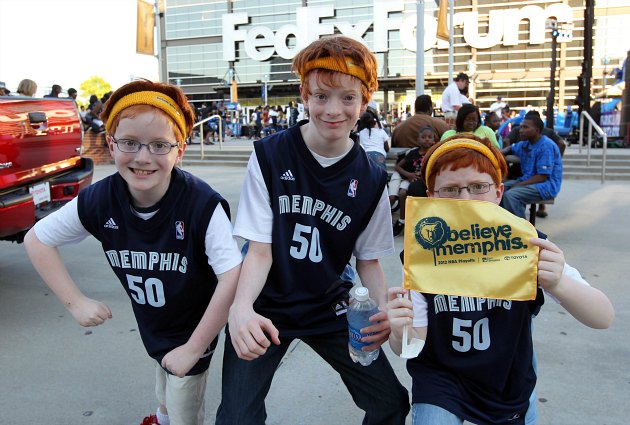
On August 14, we noted that prospective Memphis Grizzlies owner and Silicon Valley businessman Robert Pera had seen his bid to join the NBA look less likely after questions concerning his cash flow and business in Iran. While the the circumstances of the latter issue were unclear and perhaps an honest mistake, the problems of the former were more substantial. In less than 12 months, Pera had fallen from the ranks of American billionaires and had his company's stock plummet. Given those developments, it seemed unlikely that he'd ever be approved as an NBA owner.
Pera realized those issues, because he's added some important new members to his investment group. Pera hasn't only improved the financial outlook — he's done so in a way that will ensure the Grizzlies will stay in Memphis for the foreseeable future. From Geoff Calkins and Kyle Veazey for The Memphis Commercial Appeal:
Prospective Grizzlies owner Robert Pera has reached an agreement with a group of local partners that will practically guarantee the franchise's future in Memphis for another 15 years.
Pera has agreed to three provisions: 1) a $100 million penalty if the team is moved, 2) a right of first refusal under which the local owners will be able to match any offer Pera receives to sell the team and 3) the right for the locals to buy the team from Pera at the current price if he wants to move it. All provisions are in effect for the next 15 years.
The local group includes J.R. "Pitt" Hyde, Staley Cates, Ed Dobbs, Duncan Williams and Billy Orgel. Cates confirmed the details of the agreement Monday, as did a source close to Pera. "Most importantly, the team's not going anywhere," Cates said. "That's the whole point. That's the main thing that this is all about."
Hyde, the founder of AutoZone, and Cates, president of Southeastern Asset Management, are holdovers from the old local ownership group under current owner Michael Heisley. Dobbs is the CEO of Dobbs Management, Williams is the CEO of Duncan-Williams investment firm and Orgel is CEO of Tower Ventures. Other partners are expected to emerge.
This is excellent news for the city of Memphis, the Grizzlies, and their fans. It's also an important step for Heisley, who emphasized the importance of keeping the Grizzlies in the city when he announced his agreement with Pera in June. All parties are going to be happy with this deal — Pera is now very likely to get his team, Heisley can sell without only looking interested in profits, and the NBA will be able to save itself the embarrassment of a drawn-out sale process. No deal is official yet, of course, but things certainly look a lot better than they did two weeks ago.
Memphis will always be a relatively small market in the NBA landscape, the sort of time that thrives on good management rather than the innate draw of a city like New York. However, two consecutive postseason berths have marked out the Grizzlies as an improving and exciting squad, so a foundation is being built. In a general sense, Pera's agreement also ensures that Memphis will have the chance to build with the Grizzlies in a way that Vancouver, the franchise's home from 1995 to 2001, never had. In 15 years, the Grizzlies will have been in Memphis for more than a quarter-century. That's enough time for any franchise to prove its sustainability.
Contrary to David Stern's unconvincing protestations, the NBA is not necessarily move-averse — in recent history, they've certainly not seemed particularly concerned with keeping teams in Seattle and Sacramento. What the league does care about, though, is making sure that franchises not move around like nomadic tribes and actually attempt to build for the long term before moving on. That's why Stern was perfectly willing to buy the New Orleans Hornets before selling them to Tom Benson, and it's also why Stern has claimed that the failure of Vancouver is his greatest regret as commissioner. If the Grizzlies had moved from Memphis, it would have been a bad look for the league as a whole. This new investment group promises that Memphis will get their opportunity to be a great NBA city. If the experiment isn't successful, we'll probably be looking at another squabble between owners and municipal leaders 15 years from now.
No comments:
Post a Comment